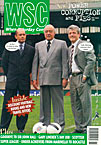 Berlin may be Germany's capital but is a city of footballing minnows. Uli Hesse-Lichtenberger looks at the city's underachievement
Berlin may be Germany's capital but is a city of footballing minnows. Uli Hesse-Lichtenberger looks at the city's underachievement
Berlin is the most bizarre of the European metropolises, decadent and yet slightly provincial, megalomaniacal but isolated, both historically and geographically. People from Berlin are friendly, open and yet inaccessible, stuck up; they are proud of their city and its history, even though for the greater part of this century Berlin has been associated with two brutal regimes. What has that to do with football? Everything.
In the past three decades Berlin has had more clubs in the top flight than any other German city, but all of them have failed miserably: Hertha have been relegated from the Bundesliga four times while Blau-Weiss 90 and Tennis Borussia never finished higher than 17th place.
Then there was the strange tale of Tasmania. In 1965 Hertha were relegated as punishment for shady financial deals (in true Berlin-style, the club’s treasurer was an undertaker by trade). But the mortar had hardly dried on the Wall, and it was felt that Berlin had to be represented in the Bundesliga. Thus poor Tasmania were called up to take Hertha’s place, and promptly set an all-time record by getting just eight points from 34 games. (It is one of football history’s more cruel jokes that the teams joining the Bundesliga in the same year as Tasmania were Bayern Munich and Borussia Mönchengladbach, who have since won 17 league titles between them.)
There had been a time, however, when it was a bit more glamorous to be a football fan in Berlin. Before 1922, the city was a powerful force in Germany: Viktoria and Union 92 won three championships between 1905 and 1911, Union Oberschönweide (since renamed 1.FC Union and in the GDR until re-unification) came in second in 1923, while Hertha reached the final of the championship play-off six times in a row (1926-1931), winning twice.
But then came the Nazis. The Roaring Twenties ended for good, and things were never the same again. As if politics had contaminated the football clubs, Berlin’s teams got worse with every crisis; and to actually build a wall around half of them was as symbolic as it was devastating.
Located in a city that was becoming increasingly neurotic and literally cut off from the rest of the league, Hertha found it difficult to attract players to what was in effect an island and couldn’t find ways of keeping young prospects from moving west. On the other side of the wall, 1.FC Union weren’t faring much better: being the people’s club didn’t cut much ice – the army’s BFC Dynamo, once a nonentity, won medals on orders from above.
And there were other problems besides politics, at least in the western part of the city. Hertha had a core of die-hard supporters (dubbed the ‘Frogs’ because of their pogo-like dance), but for the majority of football fans there was no middle ground: it was always either ecstasy or apathy: when things were going well they came out in droves, when reality took over, they stayed home sparing themselves the humiliation of seeing their team lose to clubs from the backwoods. Hertha’s spacious Olympic Stadium, built for Hitler’s Games and in dire need of repair, can be awfully depressing when only 8,000 hardened loyalists show up.
Money, some people think, is an antidote to depression, and in the mid-90s Berlin decided to prove it. Local businessmen were told that it was their patriotic duty to bolster Hertha’s finances. Profits were to be made too. The Bertelsman conglomerate and its subsidiary, UFA, whose main revenue comes from selling television rights, gave the club 20 Million Marks (about £7 million) and appointed a member of its board to preside over Hertha’s directors, just to be on the safe side.
A young team anchored by a handful of Bundesliga dropouts was assembled and on 7th April the city proved Hertha’s strategy right: 75,000 people came out to see the team. Hertha’s opponents that day were Kaiserslautern; Hertha won 2-0, and a few weeks later both clubs got promoted.
The new season began with a flourish: expensive signings (Bryan Roy from Forest, Norwegian Kjetil Rekdal from Rennes), 76.000 fans at the Olympic Stadium and a draw against Dortmund. That, however, was as good as it got. Two months later, Hertha have won for the first time, 1-0 against Cologne, and are propping up the table with five points from eight games.The UFA people are getting restless: following a sobering loss at Wolfsburg (pop.120,000) they suggested that a sizeable part of their investment should be retroactively declared a loan. Not for them the vagaries of football.
Hertha, named after the ship on which its founding fathers met in 1892, faces a dilemma: the club thinks it’s entitled to be in the Bundesliga by virtue of tradition alone, at the same time it’s run in a modern, no-nonsense style. Stability and peace will only come to Hertha if their owners place football before profit but the UFA people don’t want to know about that, and they can justify their outlook by pointing to 1.FC Union, regularly barred from taking up promotion into the Second Division for financial irregularities. But that’s Berlin for you, where nothing has ever been as easy as they want you to believe.
From WSC 129 November 1997. What was happening this month